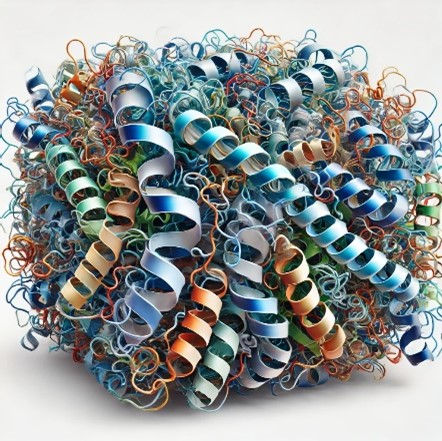Unveiling new frontiers in protein science: The 2024 Nobel Prize in chemistry
- Stéphanie

- Nov 4, 2024
- 3 min read
The Nobel Prize in Chemistry 2024 celebrates breakthroughs at the intersection of biology, chemistry, and artificial intelligence, honoring David Baker, Demis Hassabis, and John Jumper for their work in computational protein design and AI-based protein structure prediction. These innovations are poised to revolutionize medicine, environmental science, and materials development, addressing challenges that were once thought insurmountable[1].
Computational protein design - Building life’s new tools
David Baker, a pioneer in protein design at the University of Washington, transformed our understanding of proteins by developing Rosetta, a program capable of creating entirely new proteins with unique functions. This leap in protein design enables scientists to engineer proteins that do not exist in nature, resulting in versatile applications.

For instance, Baker’s team has designed proteins that can detect environmental toxins like fentanyl and block viral particles, including the coronavirus[2].
Through custom-made proteins, Baker’s work opens doors to applications in therapeutics, nanomaterials, and environmental sensors. These synthetic proteins can be tailored to function precisely where traditional proteins fall short, which has remarkable implications for drug development and sustainable material design[3].
AlphaFold and AI-powered protein structure prediction
The challenge of predicting a protein’s shape based on its amino acid sequence has baffled scientists for decades. However, this changed when Demis Hassabis and John Jumper from Google DeepMind introduced AlphaFold. Using advanced AI, AlphaFold solved this "protein folding problem," enabling researchers to predict the three-dimensional structures of proteins with unprecedented accuracy. Since its release, AlphaFold has mapped nearly all known protein structures, allowing scientists to gain insights into everything from antibiotic resistance mechanisms to enzymes that could decompose plastics.

AlphaFold’s impact on drug discovery and structural biology is monumental. It provides researchers with a toolkit to design treatments faster and understand complex biological processes with clarity. Such a tool aligns well with NETO Innovation’s focus on scientific advancements that drive sustainability and efficiency, as researchers now use AlphaFold to address environmental challenges like plastic degradation.
Impact on the future of science and industry
The Nobel-winning advancements in protein science have significant implications across various scientific and industrial fields. By enabling the design of entirely new proteins and the accurate prediction of protein structures, these discoveries open doors to innovations in medicine, environmental sustainability, and materials science.
In medicine, the ability to design proteins could lead to highly specific treatments, such as drugs that target disease mechanisms precisely without affecting healthy cells. This approach could advance personalized medicine, allowing treatments to be tailored to individual genetic and biochemical profiles.
In environmental science, AlphaFold’s structural predictions enable scientists to better understand enzymes that can break down complex pollutants, such as plastic. This technology could be transformative for environmental remediation efforts, providing sustainable methods for waste degradation and pollution control.

Lastly, in materials science, custom-designed proteins offer potential for creating biomaterials that replicate nature’s precision. This could be beneficial in fields such as renewable energy, where materials need to be both durable and efficient. The future holds vast possibilities as computational tools like AlphaFold and Rosetta continue to evolve, integrating machine learning with biochemical research to address global challenges and push the boundaries of scientific knowledge.
At NETO Innovation, we’re committed to supporting groundbreaking projects in healthcare, materials science, and sustainable development. With expertise in grant writing and funding strategies, we help our clients navigate complex application processes. For healthcare projects, we focus on enabling advancements especially in immunology and medical devices. In materials science, we work alongside researchers and developers pushing the boundaries of sustainable, high-performance materials. For projects focused on environmental sustainability, our goal is to help bring innovative, eco-friendly solutions to market.
By aligning with scientific excellence and impactful research, NETO Innovation is dedicated to empowering clients to realize their vision and contribute to a more sustainable and healthier world.
Connect with us on LinkedIn for more insightful content.

References:




Comentarios